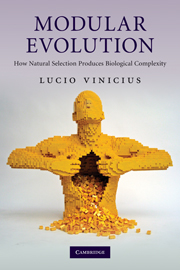
-
Select format
-
- Publisher:
- Cambridge University Press
- Publication date:
- 05 June 2012
- 15 July 2010
- ISBN:
- 9780511762994
- 9780521429641
- 9780521728775
- Dimensions:
- (228 x 152 mm)
- Weight & Pages:
- 0.51kg, 248 Pages
- Dimensions:
- (228 x 152 mm)
- Weight & Pages:
- 0.4kg, 248 Pages
You may already have access via personal or institutional login
Book description
Natural selection is more than the survival of the fittest: it is a force engendering higher biological complexity. Presenting a new explanation for the tendency of life to become more complex through evolution, this book offers an introduction to the key debates in evolutionary theory, including the role of genes and sex in evolution, the adaptive reasons for senescence and death and the origin of neural information. The author argues that biological complexity increased through the process of 'modularity transfer': modular phenotypes (proteins, somatic cells, learned behaviours) evolved into new modular information carriers (regulatory proteins, neural cells, words), giving rise to new information systems and higher levels of biological organisation. Modular Evolution makes sense of the unique place of humans in evolution, both as the pinnacle of biological complexity and inventors of non-biological evolution.
Reviews
'… interesting and informative …'
Source: Evolution & Development
'… stimulating food for thought …'
Source: The Quarterly Review of Biology
Contents
Metrics
Altmetric attention score
Full text views
Full text views help Loading metrics...
Loading metrics...
* Views captured on Cambridge Core between #date#. This data will be updated every 24 hours.
Usage data cannot currently be displayed.
Accessibility standard: Unknown
Why this information is here
This section outlines the accessibility features of this content - including support for screen readers, full keyboard navigation and high-contrast display options. This may not be relevant for you.
Accessibility Information
Accessibility compliance for the PDF of this book is currently unknown and may be updated in the future.


